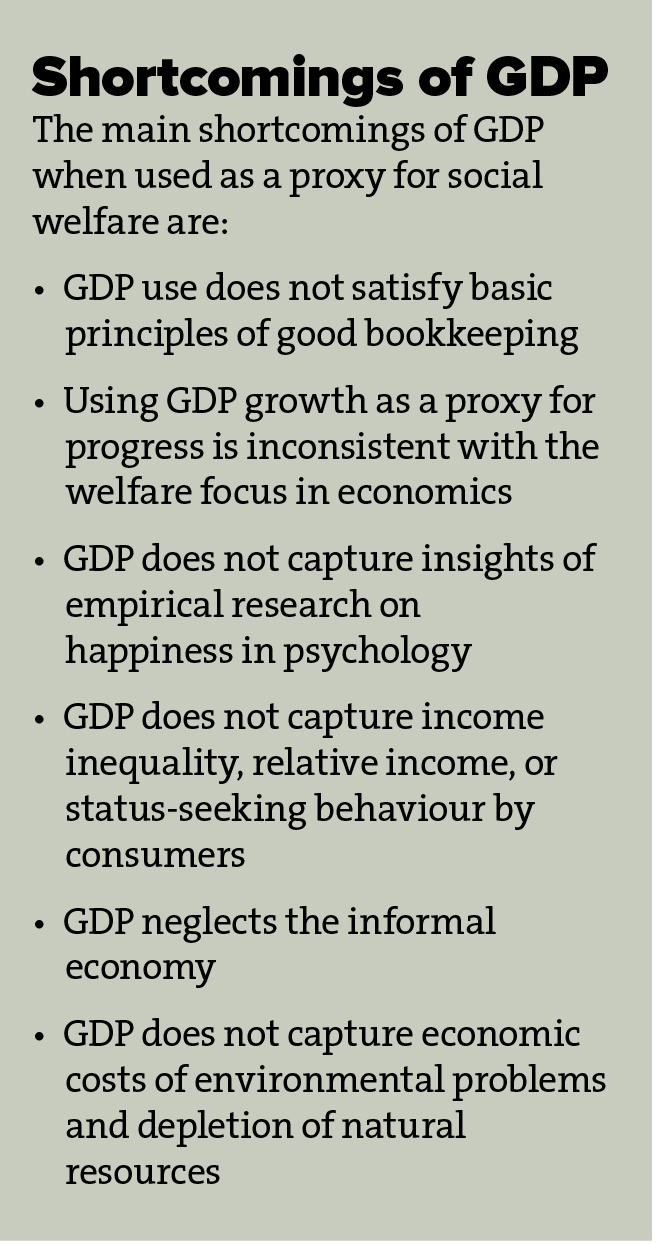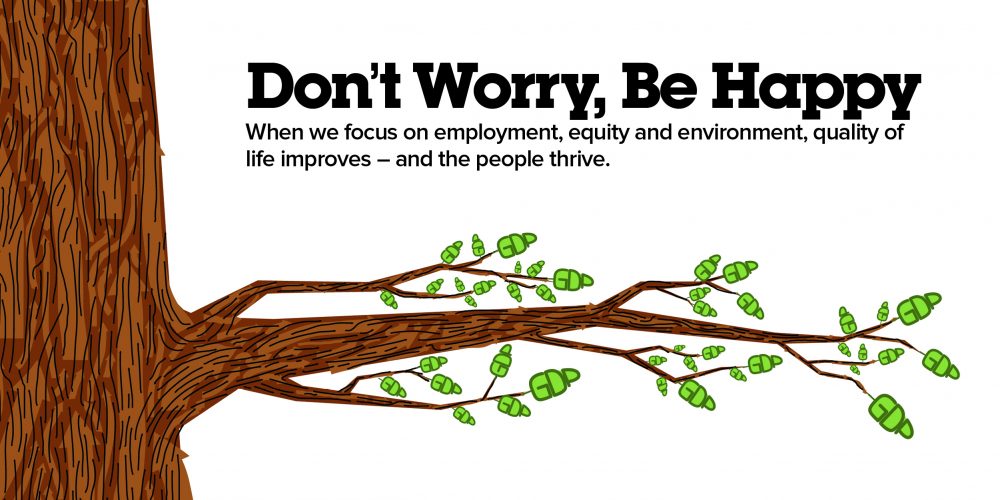A great revolution is waiting for us,” once said Nicolas Sarkozy, former French president, at Sorbonne University in 2009. He continued, “For years, people said that finance was a formidable creator of wealth, only to discover one day that it accumulated so many risks that the world almost plunged into chaos.”
A great revolution is waiting for us,” once said Nicolas Sarkozy, former French president, at Sorbonne University in 2009. He continued, “For years, people said that finance was a formidable creator of wealth, only to discover one day that it accumulated so many risks that the world almost plunged into chaos.”
Sarkozy referred to the world recession of 2008. He said reliance on GDP statistics for policy creation was a major factor. He also said that dealing with the aftermath not only makes us, “free to imagine other models, another future, another world. It obliges us to do so.”
This reimagining came from a report Sarkozy commissioned to Nobel Prize-winning economists Joseph Stiglitz and Amartya Sen and their team about critiquing GDP as an indicator of progress.
The report’s authors write in their introduction, “There is no single indicator that can capture something as complex as our society. But because what we choose to measure and how we construct our measures can have such an important role in the decisions that are made, it is important that there be an open and public discussion of our system of metrics.”
What Stiglitz et al. are alluding to is what I call the GDP paradox: the fact that it’s widely proven and accepted that Gross Domestic Product – the monetary value of all final market goods and services produced in a period in a country – is not a good indicator of progress, and yet society is unable to let it go.
Many could argue Sarkozy was only open to thinking beyond GDP because the predictions of economic growth under his government at the time were unfavourable. His “beyond GDP” message could be viewed as a political cover-up. Whatever the reason, Sarkozy’s actions finally put serious critique of GDP into the global spotlight.
The enduring growth debate
More generally in academic circles, “beyond GDP” has never meant letting go of GDP, but adding alternative indicators to it. The search for alternative progress indicators has been going on for decades without success. While I don’t think we should give up on this search, it has been impossible to convince national account statisticians and politicians to replace the GDP with a better indicator.
One reason is that all reasonable alternatives need considerable data that are not consistently available over time and for all countries. An imperfect alternative would be the Human Development Index, but even though it is well known and widely used in the context of debate about developing countries, it has not received serious attention in policy discussions within rich countries. Incidentally, the Human Development Index shows that rich countries have reached a plateau of welfare, despite continual growth in GDP. This confirms the belief that growth does not contribute much to progress in rich countries.
A critique of GDP as an indicator of social wellbeing
There are many well-documented shortcomings of GDP as a measurement of welfare. I’ve listed the most important in “Shortcomings to GDP” on page 24. These imply that the GDP indicator cannot be relied upon to capture social welfare in general, i.e. under all circumstances, in all countries, and in all periods of time. The use of GDP as a progress indicator therefore represents a serious form of “information failure,” which is likely to steer the economy in the wrong direction from a social-welfare angle.
Unfortunately, many people with political influence unconsciously still see the GDP as a good welfare measure. Politicians, journalists and economists get nervous when the GDP grows less than last month or last year. Information about GDP growth still has a large influence on the economy as choices made by consumers, companies and financial institutions are affected by expectations about, and forecasts of, the GDP. This can be regarded as paradoxical in view of the widely accepted critique of GDP as a welfare or progress indicator.
The various shortcomings of GDP as a welfare or progress indicator suggest that we should ignore the GDP (per capita) indicators in public debates and policy making, and focus instead on more direct indicators of employment, equity and the environment. In this scenario, we would be indifferent about the desirability or undesirability of GDP growth. This is expressed by the term “agrowth.”
The aim of agrowth is to let go of economic growth as a sufficient and even necessary condition for realizing welfare, and instead take a rational approach to public decision-making. It is not against growth or in favour of zero growth. It just eliminates the unnecessary constraint of unconditional GDP growth. As a society, we need to realize that unconditional GDP growth (growth fetishism) is a constraint on our search for human progress, and without it we will arrive at better welfare outcomes.
For example, if economic growth tends to result from higher incomes rising faster than lower incomes, then striving for a more fair income distribution will be frustrated by a constraint that growth rate of average income (GDP per capita) should exceed a minimum threshold.
Or, if youth unemployment is high, then using public funding to create work experience may reduce long-term unemployment rates, but will likely reduce short-term GDP growth as the government has to raise more taxes. So, requiring high growth will hamper this type of work-experience policy.
While these examples show how prioritizing economic growth hampers social development, you might be wondering what exactly an agrowth strategy implies for economic growth? It would mean that we would at some points be willing – without even realizing, as we would ignore GDP information – to give up some (potential) GDP growth for a better environment, less unemployment, more income equality, more leisure, better health care, and more public services. Policy would prioritize net individual well-being and social welfare rather than average income. Economic growth would no longer be assumed as necessary or sufficient for progress. In other periods, desirable economic change might well be consistent with growth, but nobody should really care or know, as GDP would be disregarded. As a result, one could have periods of high growth followed by periods with low growth, or even a decline, in GDP terms, while maintaining progress in welfare terms.
An agrowth view will enhance the social-political acceptability of key public policies focusing on solving urgent and socially important problems.
Clear examples of welfare policy priorities are avoiding dangerous climate change, minimizing structurally high unemployment, and reducing extreme inequality and poverty. Associated policies would be judged on concrete indicator targets for each of these problems. Whether they would work out well in terms of growth would no longer matter. By not observing GDP movements, one would become truly indifferent about the GDP performance, as a good social welfare analyst should be. As a consequence, society can focus on important problems and replace GDP-growth-enhancing policy with welfare-enhancing policy.
Unlike the unconditional positive, zero, or negative growth required under growth and anti-growth strategies, agrowth allows for selective decline and selective GDP growth of different sectors over time. This is needed to enhance welfare, regardless of whether the sum of their changes amounts to growth or not.

Political feasibility
Beliefs in GDP and growth are dogmatic in nature, fuelled by the persistent repetition of (mis)information through economics education and the public media. Many economists agree that GDP per capita is not a good measure of social welfare, but are then still unwilling to set it aside. An agrowth strategy is likely to be judged as odd in the current political setting where growth is the predominant goal.
Nevertheless, agrowth has a chance to become a serious line of thought, as there is a slowly but steadily increasing recognition among politicians and economists of the shortcomings of the GDP indicator, and increasing support for a more critical treatment of GDP information by international organizations like the OECD and the World Bank. Influential economists have stated in public that the times of high growth are over for several reasons, and that future growth may not be as high as it was in the past. They publish papers with titles like Robert Gordon’s “Is U.S. Economic Growth over?”
Some view Sarkozy’s stance on “Beyond GDP” as a failure, and some as leadership. Perhaps Sarkozy’s presentation of Stiglitz and Sen’s critical report was just a ruse to avoid disappointment about not reaching economic goals. Nevertheless, it could be the beginning of an international tipping point in favour of national policy that finally prioritizes welfare of the people over GDP.
Jeroen van den Bergh is ICREA Research Professor in the Institute of Environmental Science and Technology (ICTA), Universitat Autònoma de Barcelona, Spain. In addition, he is an honorary professor of Environmental and Resource Economics at VU University Amsterdam (VUA) in the Netherlands. He is editor-in-chief of the journal Environmental Innovation and Societal Transitions.
Jeroen van den Bergh is ICREA Research Professor in the Institute of Environmental Science and Technology (ICTA), Universitat Autònoma de Barcelona, Spain. In addition, he is an honorary professor of Environmental and Resource Economics at VU University Amsterdam (VUA) in the Netherlands. He is editor-in-chief of the journal Environmental Innovation and Societal Transitions.












